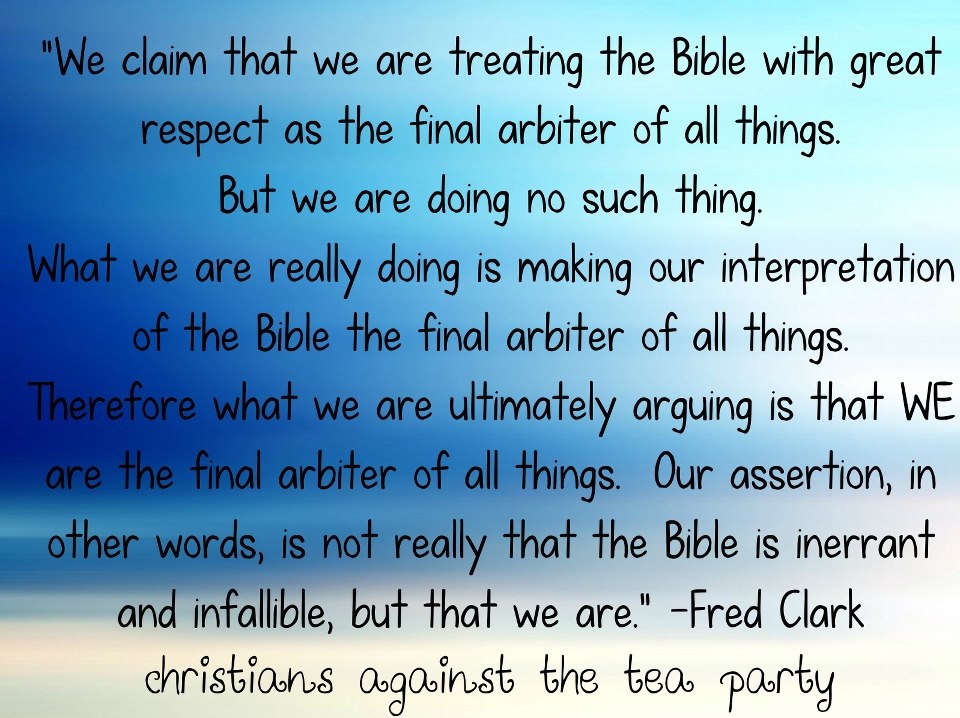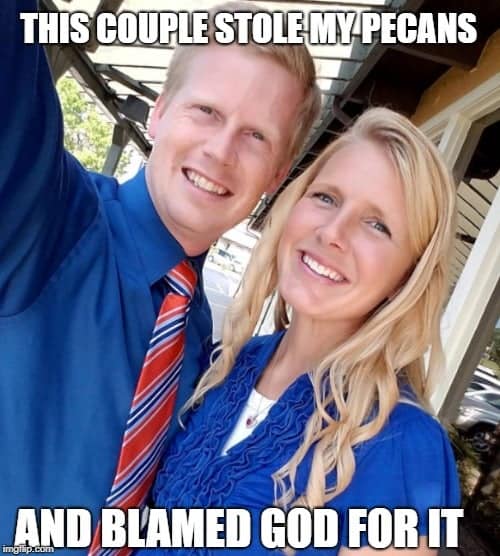After writing yesterday’s post I read an exchange between Chris Hallquist and James McGrath regarding Fred Clark’s quote. This exchange got me thinking about how evangelicals/fundamentalists and liberal Christians approach the Bible, and about how atheists approach evangelicals/fundamentalists and liberal Christians.
First, Chris’s post:
A pet peeve of mine is liberal Christians who make ridiculous accusations against fundamentalists. For example, this quote from Fred Clarke, posted a few days ago by James McGrath:
Anyone passingly familiar with fundamentalists knows that this is obviously false, as shown by the fact that fundamentalists, yes even fundamentalists, sometimes do admit they were wrong about something. That includes changing their mind about points of Biblical interpretation.
As someone who cares about the truth, I find the idea of people passing around such obvious falsehoods disturbing. Yes, fundamentalists are awful, but that fact doesn’t justify nonsense like this. In fact, it makes it unnecessary: by a wide margin, there’s enough wrong with fundamentalists that we don’t need to go around making stuff up about them.
Falsehoods about fundamentalists on this scale seem to be a specialty of liberal Christians. I suspect this is because accurate criticisms of fundamentalism–like “the book which fundamentalists claim is inerrant is actually deeply flawed”–are closed off to liberal Christians, because such criticisms would involve admitting things which are embarrassing to Christians of every stripe.
As I said yesterday, Fred’s quote rings very true to me, and it outlines something I myself have run up against. I don’t see how, as Chris claims, saying that evangelicals and fundamentalists are making “their interpretation of the Bible the final arbiter of all things” is “making stuff up about them” or “passing around” “obvious falsehoods” for the simple reason that I don’t think it’s a falsehood. I’d love to hear more from Chris on what exactly he means here, since his post is more of an assertion that an explanation.
But Chris’s post does raise some thoughts. The Bible is a mixed up jumble of books that has to be understood through some sort of interpretive framework. The fact that the doctrine of the Trinity is never stated explicitly and that early Christians argued for hundreds of years about the divinity or humanity of Christ makes this clear. This shouldn’t be surprising given that the Bible is an amalgam of material from different periods and by different authors and written for different purposes. Every Christian ever has formed some sort of grand interpretation of what is written in the Bible. The fact that evangelicals and fundamentalists sometimes change their minds, slightly shifting their interpretation, does not mean that they don’t nevertheless move forward holding to their slightly altered interpretations as Infallible Truth.
I think that one thing that is going on here is that evangelicals and fundamentalists claim over and over and over again that all they are doing is taking the Bible “at face value.” According to evangelicals and fundamentalists, they are the ones who are actually following the Bible and liberal Christians are not. Liberal Christians, they say, have rejected the Bible and simply do and believe whatever they think best. Because evangelicals and fundamentalists trumpet this message so loudly, it can be easy to end up taking them at their word.
Growing up as an evangelical, I accepted and internalized the message that we were the ones actually following the Bible and that all other Christians ignored or rejected it. When I went off to college and stepped out of my evangelical bubble, I was surprised to find that this was incorrect. For a time I stepped into liberal Christianity, glorying in the fascinating interpretations and understandings of the Bible I found there. Not every Christian approaches or understands the Bible identically.
I said yesterday that while I don’t see any reason to think the Bible is divinely inspired I do think some interpretations of the Bible are more “correct” than others. As an evangelical, there was very little examination of the cultural context of the Bible, and there certainly wasn’t any higher criticism. We thought that all we needed to understand what the Bible said was … the Bible. What I found in liberal Christianity was very different. There was an attempt to understand cultural context, a desire to truly dig into who wrote the different books and for what purposes, and a willingness to admit that some sections were added later and some passages doctored to prove a point. There was an openness to seeing the Bible as fallible and containing errors. I found that liberal Christians had a completely different approach to the Bible.
While I very much enjoyed exploring liberal Christian understandings and interpretations of the Bible, in the end I ended up realizing that I saw no reason at all to view the Bible as divinely inspired, or, indeed, as anything more than a man-made book. I also became a bit disillusioned at all that liberal Christians sometimes had to do to explain away certain passages or ideas. I began to feel that while liberal Christians did not stick their heads in the sand the way evangelicals and fundamentalists so often do, they, too, were concocting an interpretation of the Bible that, while more “correct” in a technical sense, also involved a selective reading. Of course, liberal Christians don’t claim to be bound by the Bible in the same way evangelicals and fundamentalists do, so seeing the Bible as more and more man-made was not the only thing that led me away from Christianity entirely (there was also the fact that basic Christian doctrine simply stopped making sense, and the fact that I realized that my “relationship with Jesus” was almost certainly just a figment of my imagination).
Anyway, after Chris posted the above James McGrath responded as follows:
There is a rather bizarre post by Chris Hallq on his blog “The Uncredible Hallq” in which he takes aim at liberal Christians, and in particular myself and Fred Clark.
…
Hallq … suggests that liberal Christians don’t point out that the problem with fundamentalists is not their own flawed perspective but the flawed text of the Bible itself, saying that this would involve admitting something that is “embarrassing to Christians of every stripe.”
To which I can do little but shake my head in disappointment that someone would criticize a phenomenon they understand so little and about the history of which they are so poorly informed.
Liberal Christianity pioneered Biblical criticism, the tools and methods that exposed the Bible’s fallibility. The methods and the results of that approach are widely embraced by atheists like Hallq. For them to then turn around and suggest that the results of them are an embarrassment to liberal Christians, rather than something liberal Christians were among the first to draw attention to, is rather insulting – as I’ve said before.
Like I said above, I think evangelicals and fundamentalists have been so good at getting their message out – the idea that they are following the Bible while other Christians ignore it – that they have a sort of cultural monopoly on the Bible. This is extremely unfortunate because liberal Christians’ interpretation of the Bible generally includes things like gender equality and social justice while evangelicals and fundamentalists’ interpretation of the Bible is incredibly harmful.
I’ve seen a good number of liberal Christian bloggers in recent months suggest that atheists read the Bible like fundamentalists. I have found this discussion fascinating. The conversation will go like this:
Atheist: “How could a loving God torture people in hell for eternity?”
Liberal Christian: “I don’t believe in hell.”
Atheist: “Wait, what? But the Bible is very clear that hell exists!”
And then the atheist will start pulling out proof texts like a fundamentalist. This same conversation takes place regarding creationism – “but the Bible says the world was created in six days!” – and the Old Testament genocides – “how can you say those didn’t happen? It says right here in plain English that they did!”
I think we atheists need to remember something: Not everyone interprets the Bible like a fundamentalist or evangelical. Liberal Christians are generally more than ready to admit that the Bible is flawed or contains errors. I think we can become so used to combating evangelicalism and fundamentalism that we forget that those strains of Christianity are both not the only ones out there and not the oldest ones out there either. In some sense, this is not surprising. Evangelical and fundamentalist positions are, after all, extremely easy to pick on. Further, evangelicals and fundamentalists are doing a lot of damage in our society today and it’s thus only natural that they should so often be the focus.
There is something else too, though. I think it can be easy to become so used to hearing the rhetoric of evangelicals and fundamentalists that we end up thinking that, as far as Christianity is concerned, the evangelicals and fundamentalists have it right and all others who call themselves “Christians” are doing it wrong. This is where we start trying to convince liberal Christians that yes, the Bible does say hell exists and means eternal torture, and yes, the Bible does say that God commands genocide, etc, forgetting that liberal Christians don’t approach the way evangelicals and fundamentalists do. Of course, some atheists may honestly be convinced that the evangelical/fundamentalist approach is the only intellectually honest Christian position out there, and that liberal Christians are just hedging. They may thus see convincing liberal Christians of this as a valid strategy in an attempt to get a liberal Christian to leave Christianity, and that’s fine. This is not, however, a strategy I use or necessarily think wise. I personally see it as overly simplistic and intellectually lazy. It also involves ignoring thousands of years of Christian history.
Now I’m not saying that we atheists can’t or shouldn’t discuss the problems we see with liberal Christian beliefs or faith in general. I’m not saying that we atheists should necessarily give liberal Christians a “pass.” What I am saying is that we need to be aware that just because fundamentalists and evangelicals claim to have a monopoly on the Bible does not mean that they do. We need to be aware that the set of tools and arguments we use against fundamentalists or evangelicals won’t always work on liberal Christians. We need to get over the idea that just because we understand evangelicalism and fundamentalism (or at least think we do) that does not mean that we automatically understand liberal Christianity. We need to stop siding with the evangelicals and fundamentalists when they say that they are interpreting the Bible “right” and those other Christians out there are doing it “wrong.”
Of course, some atheists are more concerned with helping improve the associations people have with the term “atheist” than with actually attacking religious beliefs. Some atheists are more concerned with protecting the separation of church and state than anything else. Some atheists focus on taking down evangelical and fundamentalist proofs for the existence of God while others are more interested in attacking the idea of “faith” in general. Some atheists focus on things like equality and social justice and are willing to make alliances with liberal Christians who share their goals and ideals in these areas. Some atheists don’t care about any of this and just focus on living their lives. Everyone has different interests and motivations, and that’s as it should be. But at the very least, we should avoid the assumption that evangelicals can or should speak for all Christians. At the very least we should be willing to admit the diversity of Christianity and careful to avoid thinking like fundamentalists.
For another really good discussion on this same issue over on Camels with Hammers, click over to Why Let the Fundamentalists Define Their Religions? It’s an excellent read.














